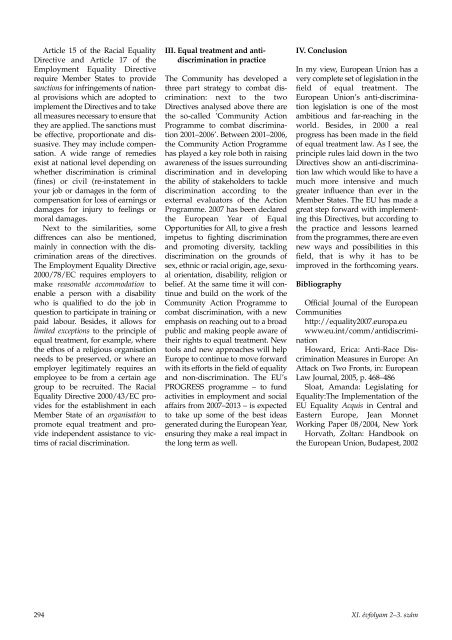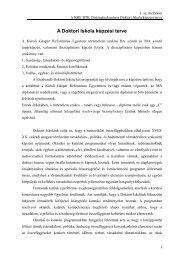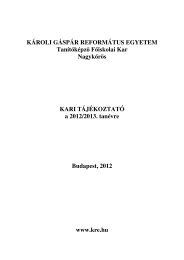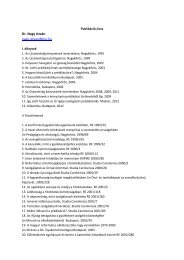collega - Károli Gáspár Református Egyetem
collega - Károli Gáspár Református Egyetem
collega - Károli Gáspár Református Egyetem
Create successful ePaper yourself
Turn your PDF publications into a flip-book with our unique Google optimized e-Paper software.
Article 15 of the Racial Equality<br />
Directive and Article 17 of the<br />
Employment Equality Directive<br />
require Member States to provide<br />
sanctions for infringements of national<br />
provisions which are adopted to<br />
implement the Directives and to take<br />
all measures necessary to ensure that<br />
they are applied. The sanctions must<br />
be effective, proportionate and dissuasive.<br />
They may include compensation.<br />
A wide range of remedies<br />
exist at national level depending on<br />
whether discrimination is criminal<br />
(fines) or civil (re-instatement in<br />
your job or damages in the form of<br />
compensation for loss of earnings or<br />
damages for injury to feelings or<br />
moral damages.<br />
Next to the similarities, some<br />
diffrences can also be mentioned,<br />
mainly in connection with the discrimination<br />
areas of the directives.<br />
The Employment Equality Directive<br />
2000/78/EC requires employers to<br />
make reasonable accommodation to<br />
enable a person with a disability<br />
who is qualified to do the job in<br />
question to participate in training or<br />
paid labour. Besides, it allows for<br />
limited exceptions to the principle of<br />
equal treatment, for example, where<br />
the ethos of a religious organisation<br />
needs to be preserved, or where an<br />
employer legitimately requires an<br />
employee to be from a certain age<br />
group to be recruited. The Racial<br />
Equality Directive 2000/43/EC provides<br />
for the establishment in each<br />
Member State of an organisation to<br />
promote equal treatment and provide<br />
independent assistance to victims<br />
of racial discrimination.<br />
III. Equal treatment and antidiscrimination<br />
in practice<br />
The Community has developed a<br />
three part strategy to combat discrimination:<br />
next to the two<br />
Directives analysed above there are<br />
the so-called ’Community Action<br />
Programme to combat discrimination<br />
2001–2006’. Between 2001–2006,<br />
the Community Action Programme<br />
has played a key role both in raising<br />
awareness of the issues surrounding<br />
discrimination and in developing<br />
the ability of stakeholders to tackle<br />
discrimination according to the<br />
external evaluators of the Action<br />
Programme. 2007 has been declared<br />
the European Year of Equal<br />
Opportunities for All, to give a fresh<br />
impetus to fighting discrimination<br />
and promoting diversity, tackling<br />
discrimination on the grounds of<br />
sex, ethnic or racial origin, age, sexual<br />
orientation, disability, religion or<br />
belief. At the same time it will continue<br />
and build on the work of the<br />
Community Action Programme to<br />
combat discrimination, with a new<br />
emphasis on reaching out to a broad<br />
public and making people aware of<br />
their rights to equal treatment. New<br />
tools and new approaches will help<br />
Europe to continue to move forward<br />
with its efforts in the field of equality<br />
and non-discrimination. The EU’s<br />
PROGRESS programme – to fund<br />
activities in employment and social<br />
affairs from 2007–2013 – is expected<br />
to take up some of the best ideas<br />
generated during the European Year,<br />
ensuring they make a real impact in<br />
the long term as well.<br />
IV. Conclusion<br />
In my view, European Union has a<br />
very complete set of legislation in the<br />
field of equal treatment. The<br />
European Union’s anti-discrimination<br />
legislation is one of the most<br />
ambitious and far-reaching in the<br />
world. Besides, in 2000 a real<br />
progress has been made in the field<br />
of equal treatment law. As I see, the<br />
principle rules laid down in the two<br />
Directives show an anti-discrimination<br />
law which would like to have a<br />
much more intensive and much<br />
greater influence than ever in the<br />
Member States. The EU has made a<br />
great step forward with implementing<br />
this Directives, but according to<br />
the practice and lessons learned<br />
from the programmes, there are even<br />
new ways and possibilities in this<br />
field, that is why it has to be<br />
improved in the forthcoming years.<br />
Bibliography<br />
Official Journal of the European<br />
Communities<br />
http://equality2007.europa.eu<br />
www.eu.int/comm/antidiscrimination<br />
Howard, Erica: Anti-Race Discrimination<br />
Measures in Europe: An<br />
Attack on Two Fronts, in: European<br />
Law Journal, 2005, p. 468–486<br />
Sloat, Amanda: Legislating for<br />
Equality:The Implementation of the<br />
EU Equality Acquis in Central and<br />
Eastern Europe, Jean Monnet<br />
Working Paper 08/2004, New York<br />
Horvath, Zoltan: Handbook on<br />
the European Union, Budapest, 2002<br />
294 XI. évfolyam 2–3. szám

















